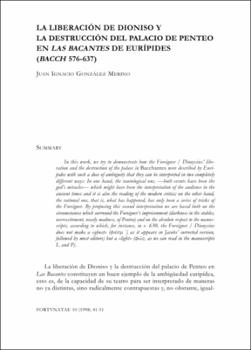La liberación de Dioniso y la destrucción del palacio de Penteo en Las Bacantes de Eurípides (Bacch 576-637)
Date
1998Abstract
In this work, we try to demonstrate how the Foreigner / Dionysius’ liberation and the destruction of the palace in Bacchantes were described by Euripides with such a dose of ambiguity that they can be interpreted in two completely
different ways: In one hand, the tautological one, —both events have been the
god’s miracles— which might have been the interpretation of the audience in the
ancient times and it is also the reading of the modern critics; on the other hand,
the rational one, that is, what has happened, has only been a series of tricks of
the Foreigner. By proposing this second interpretation we are based both on the
circumstances which surround the Foreigner’s imprisonment (darkness in the stables,
overexcitement, nearly madness, of Penteo) and on the absolute respect to the manuscripts, according to which, for instance, in v. 630, the Foreigner / Dionysius
does not make a «ghost» (favsm j) as it appears in Jacobs’ corrected version,
followed by most editors) but a «light» (fw'", as we can read in the manuscripts
L and P).





